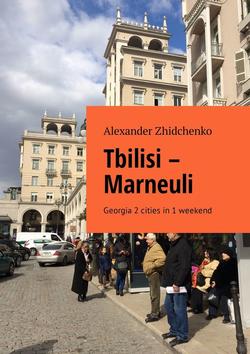Читать книгу Tbilisi – Marneuli. Georgia 2 cities in 1 weekend - Alexander Zhidchenko - Страница 5
1. HISTORY
ОглавлениеIt is known that even in the period of antiquity, in the VIII century BC. here the Greeks settled, and two centuries later the Anatolian tribes from Turkey came to these places. In the III century BC. here Iberian state was formed. It was adjacent to the Persian Empire, Albania, Sarmatia (the late Byzantine designation of the Eastern European tribes). Iberia is considered a pre-feudal state where free farmers and warriors lived. Iberian state had often to fight with the Roman Empire, which managed to capture these territories in the 65th year BC.
In 189 BC. the Roman army defeated the Seleucid army here, and a strong Armenian state was formed. At the turn of the 4th – 5th centuries, the western part of the Armenian state was captured by the Byzantine Empire. The Oriental got the Persians. Byzantium was able to exert great cultural influence on the population of this region. Many traditions in architecture, culture, music, fine arts, after experiencing Byzantine colonization, have survived to this day.
In the 7th century Arab Muslims came here and created a Muslim state – the emirate. Completely from the Muslim dependence, Georgia was able to free itself only in 1122.
In the Middle Ages, many times Georgia was under threat of being under the rule of the Persians or Turks, who had constant claims to this territory. Only the intervention of the Russian Empire decided for several centuries the fate of this country. In 1783, the largest of the Georgian states, the Kartli-Kakheti kingdom, signed the Treaty of St. George, which received the status of a protectorate of the Russian Empire.
In the XIX century, in the Caucasus, and in particular in Georgia, nationalist groups and parties enjoyed great popularity among the youth, in the end of the century there was Joseph Dzhugashvili, the future leader of the USSR, Joseph Stalin.
Keshwati Temple in Tbilisi. 1910
After the October Revolution, on May 26, 1918, Georgia declared itself an independent state, which was abbreviated by analogy with the future socialist Germany, the GDR, the Georgian Democratic Republic. It existed in this form for a short time, and on March 18, 1921 its troops were crushed by the Bolshevik army of the RSFSR. The power in Georgia passed into the hands of the Georgian Bolsheviks, and then, together with Armenia and Azerbaijan, it became part of a single Transcaucasian Soviet Socialist Republic (ZFSFR).
In 1936 Georgia gained its autonomous independence, and in connection with the abolition of the TSSFSR it became the Georgian SSR.
In 1990, democratic elections were held in Georgia for the first time, in which several political parties participated. On April 9, 1991, Georgia declared its independence from the USSR.
The country in this period had prospects for rapid economic development, but the war and socio-political contradictions had their own plans, and in 1992—93. the country became very febrile, from which first ordinary residents suffered. Former members of Georgia-South Ossetia and Abkhazia-began a war of independence, as a result of which ethnic conflicts, pogroms, and migration of the population became the most common news stories.
